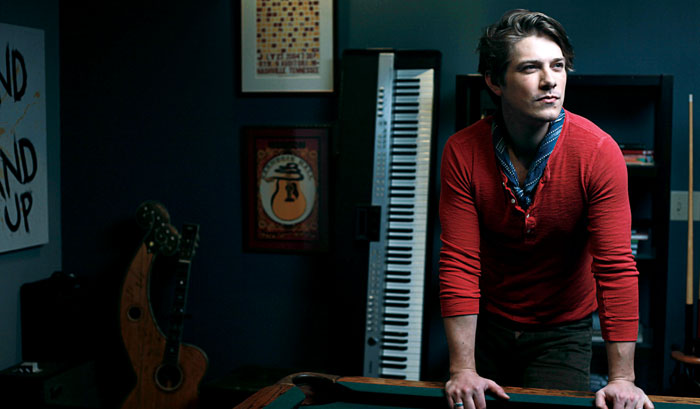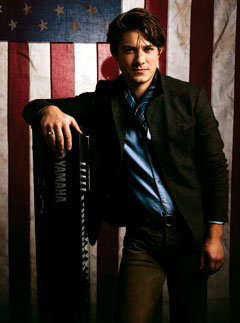


As the middle sibling of teenaged trio Hanson, keyboardist Taylor Hanson rocketed to full-fledged stardom while most of his peers were still struggling with their algebra homework. Their 1997 debut on Mercury Records, Middle of Nowhere, became a massive hit for the brothers (then just 16, 14, and 11 years old), selling 10 million copies worldwide. But when Mercury merged with Island Def Jam Records the following year, the band became entangled in a paralyzing creative struggle with their new label before finally going independent in 2001.
Since then, Hanson has continued to record and tour on their own terms - and their own label, 3CG Records. Their most recent release, 2010's Shout It Out, reached #2 on the U.S. Billboard Independent charts. We spoke with Taylor in his hometown of Tulsa, Oklahoma as he and his brothers prepared for another international tour in support of Shout It Out.
YOU WERE SO YOUNG WHEN YOU HAD YOUR FIRST BIG SUCCESS. WHAT MADE YOU WANT TO CREATE MUSIC IN THE FIRST PLACE?
It was probably the same thing that sparked the fire for millions of other people. The only difference was that it hit us as kids. I remember seeing footage of Elvis or Michael Jackson and having an innate response of, "I can do that." And also having a really strong emotional connection to '50s and '60s rhythm and blues, soul, and rock-and-roll. Hearing great singers and great pop songs, and realizing that you also happen to have some of those skills, and that if you work on them maybe you can get a shot at it.
HAS YOUR AUDIENCE CHANGED A LOT OVER THE YEARS?
Well, there's obviously a huge group of young women that have grown up with us. I don't know what is in the water, but there is some chemical that connects pop music and young girls. [Laughs.] Maybe 50 years from now somebody will study it! But over the last 15 years it's expanded into a pretty wide swath. And in the past two years, with Shout It Out, we've seen so many new fans of all ages discovering the band.

HOW HAVE YOU BEEN ABLE TO KEEP A CONNECTION WITH YOUR FANS AS TIME GOES ON?
The important thing is that we never lost the relationship we owned, which was through the website and touring. Even before being independent, we focused on building strong websites, building an official fan club, having a tight-knit community of people who feel like they're on the inside of whatever we're doing. We've kept that since '98 - it's been an ongoing thing, and I think that connection has just deepened.
AFTER YOUR EXPERIENCES WITH BOTH MAJOR LABELS AND GOING INDEPENDENT, WHAT ADVICE WOULD YOU GIVE A YOUNG BAND TODAY ABOUT GETTING THEIR MUSIC OUT?
First of all, learn the business. There is virtually nothing you can't learn if you're willing to ask questions. It's about realizing this is a business that you're going into. A lot of artists are afraid to get to know the business. There's the dream, the sparkle, the shimmer and the mystery of success, and they don't want to know too much, which I think is a scary place to be. But it's not just about avoiding being taken advantage of. It's about earning the self-confidence to go out there and be completely narcissistic, because you have to be. You have to have a really thick skin, and realize a lot of people aren't going to get it. You have to be so confident that you can take a lot of nos, and still do it.
YOU PLAY A YAMAHA CP5 STAGE PIANO. WHAT LED YOU TO THIS PARTICULAR KEYBOARD?
I got turned on to the CP5 when we played with Conan O'Brien's band. They came through Tulsa on the "Prohibited from Performing on Television" tour, and Conan actually sat in and played guitar with us. And I heard this piano, and was like, "Oh my God, what is this?"
When we perform, I'm in front - I'm not the mad-scientist keyboard player that gets to sit in back surrounded by samplers. So the feel of the piano, the dynamics, the clarity and simplicity of it have always been something I've looked for. One of the things I love about the CP5 is that you can go really deep, layer things and create sequences, but the simple things work better than on any other piano I've played. The weight of the keys, the accuracy of the vintage samples, the ability to tweak the onboard EQs. I look back to my first weighted keyboard, and it was a Yamaha, too: a PF85. That keyboard was an absolute rock - it would never break. It weighed about as much as a rock, too.
One of the things I love about the CP5 is that you can go really deep... but simple things work better than on any other piano I've played.
IT PROBABLY WEIGHED MORE THAN YOU DID.
Yeah, it did! But we carried it around to local gigs in Tulsa. So there's some history there with Yamaha keyboards. We also have a G series baby grand in our studio - it's been on almost every record we've made. It's an amazing piano to record, because it has that Yamaha brightness and clarity.
AFTER EIGHT STUDIO ALBUMS AND 15 YEARS OF TOURING, WHAT ASPECTS OF MAKING MUSIC STILL INSPIRE AND EXCITE YOU?
I love the idea of creating something out of nothing. Walking into a room, and there's nothing there, and then inventing something. When I go onstage to perform, or when we put out a record, it's almost like we're reminding people, "Hey, it's worth giving it a shot. It's worth swinging for the fences." We're swinging the way we know how to swing. We're going for it when we make a record. We're giving you what we think is the best we've got. And that spark is something we hope our fans get, like, "That just changed my day," or even "That just changed my year." Something we gave them in a song.
(Photography Credit: Nathan Presley)
























